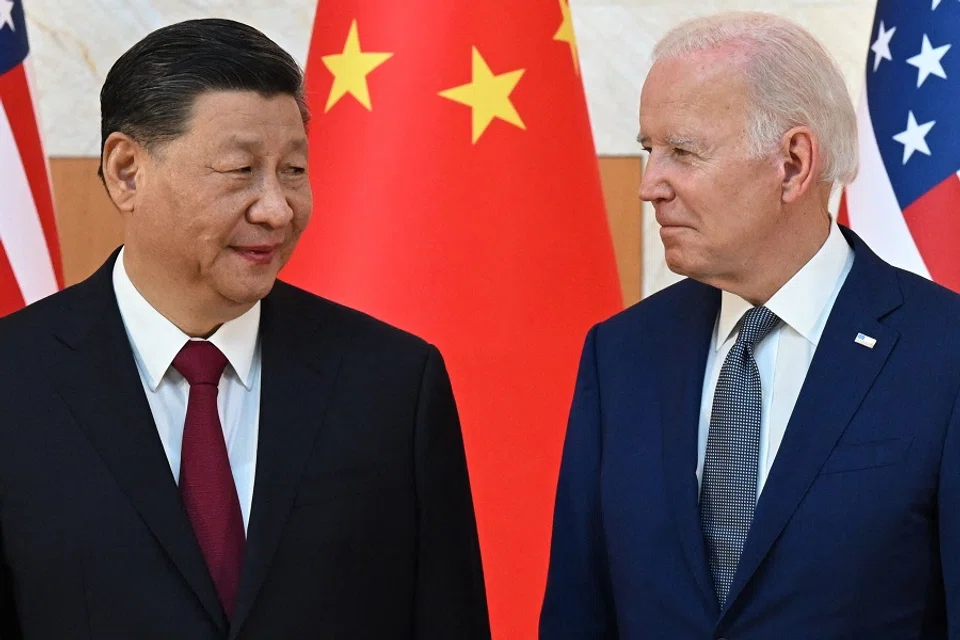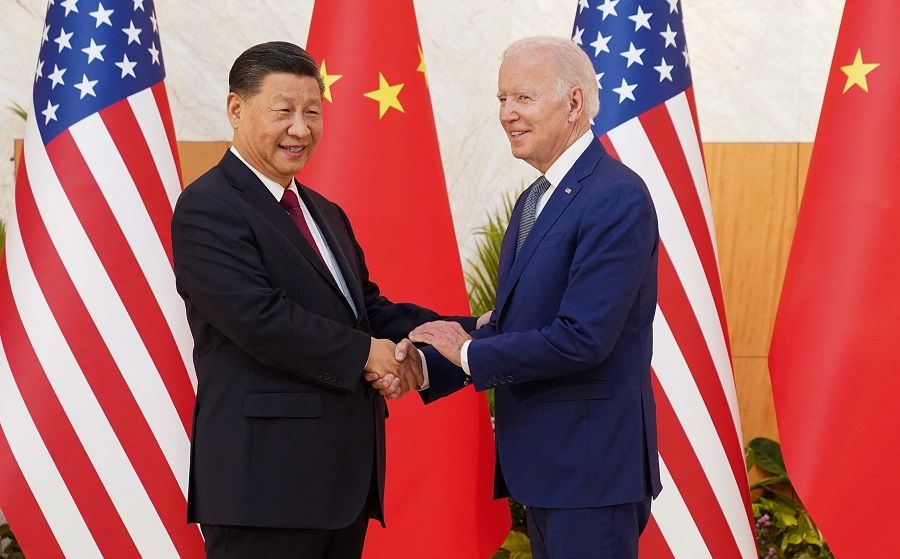Grey skies: Outlook for US-China relations in 2023

By all indications, the Biden-Xi summit in mid-November in Bali, Indonesia went smoothly. If you only hear the two leaders' opening remarks or just read the Chinese readout after the summit, you might think everything is hunky-dory.
What Biden said, according to the Chinese readout, was almost music to Beijing's ears. He said, for example, the US respects China's political system and does not seek to change it. He also said that the US does not seek a new Cold War, and does not seek to revitalise alliances against China. He also said the US does not intend to decouple from China and does not intend to halt China's development or to contain China.
None of these was included in the White House readout. Piecing the two readouts together, one will get a clearer picture, which is not rosy. The reality is the two countries are engaged in a cut-throat competition, and there is little trust between them.
One meeting will not solve all the problems that bedevil the relationship. As Biden said, "We're not going to be able to work everything out. I'm not suggesting this is kumbaya." Still, it is important to keep communication channels open since "to jaw jaw is better than to war war".
Domestic politics may derail progress
However, as 2023 approaches, the small window of opportunity for improving US-China relations may gradually be closing. Before too long, the US will enter the presidential election season, when China will predictably become the punching bag of most if not all candidates. Therefore, the two countries must seize the moment to repair the relationship before domestic politics disrupts bilateral ties again.
Biden has actually gone further than Trump in terms of competing with China and countering China's influence.

The two sides have resumed dialogue on climate change and military affairs following the Biden-Xi summit, but they need to do more now to revive bilateral exchanges. For example, there are appallingly only fewer than 400 American students reportedly studying in China now, dropping from over 11,000 in 2018. As China eases Covid controls, more Americans should be encouraged to travel and study in China. The Biden administration needs to restore the Fulbright and Peace Corps programmes in China without further delay. Biden should know better than Trump, who suspended those programmes and mistakenly believed they only benefited the Chinese.
Biden has actually gone further than Trump in terms of competing with China and countering China's influence. China and Xi Jinping have been portrayed so negatively in the Western media in recent years that it is mind boggling to see Biden and other Western leaders eager to meet with Xi now.
Perhaps the Biden administration, or at least Biden himself, has come to realise that the US will not be able to bring China to its knees through the trade war, the hi-tech war or diplomatic sanctions. The two powers have to find a way to coexist in spite of differences and disputes. But is this a change of heart or only a change of tactic?
Just days before the Chinese Communist Party (CCP)'s 20th Party Congress in October, the White House published the 2022 National Security Strategy, which unsurprisingly identified China as the only competitor that has both the intent and power to challenge US dominance, and the goal of the US strategy is to "outcompete" China.
... Xi's position at home seems secure, which suggests that he is unlikely to make concessions on major issues in China's foreign relations.

On the other hand, Xi Jinping has become more confident after the 20th Party Congress. Despite challenges related to the tough anti-Covid policies, including recent protests in several cities, Xi's position at home seems secure, which suggests that he is unlikely to make concessions on major issues in China's foreign relations.
When Biden said the US does not seek a new Cold War and does not intend to contain China, many Chinese were sceptical. What about the sweeping hi-tech exports ban to China? What about security groups such as the Quad and AUKUS that are clearly aimed at China?
Taiwan issue front and centre in the relationship
Developments in Taiwan will also frustrate US-China relations in 2023 and beyond. The pro-independence Democratic Progressive Party (DPP) did not perform well in the November local elections in Taiwan, but it may return vengefully in the January 2024 presidential election.
... the US seems to favour the DPP since it is a better chess to play with in the US-China rivalry.
The DPP portrays itself as the party that can resist pressures from the PRC and defend Taiwan's democracy. It is skillful at electioneering and will do everything possible to stay in power, and a more radical candidate may represent the DPP for the 2024 election. Many Taiwanese who voted for candidates from the relatively PRC-friendly Kuomintang (KMT) in the November election may turn to support the DPP in 2024. And most importantly, the US seems to favour the DPP since it is a better chess to play with in the US-China rivalry.
The Taiwan issue is front and centre in the US-China relationship and remains a major source of conflict. Xi asserted that Taiwan was at the core of China's core interests, and Taiwan was the first red line that the US cannot and must not cross.

Having said the US would help defend Taiwan four times in the past year, Biden was apparently trying to give the Chinese some reassurance during the summit with Xi by reiterating America's "one China" policy. Biden said the US does not support Taiwan independence and does not support two Chinas or one China one Taiwan while raising objections to Beijing's assertive and increasingly aggressive actions toward Taiwan.
The next 12 to 18 months might be a period of great danger.
All parties seeking to change the status quo?
Washington opposes unilateral change to the status quo. But what is the status quo across the Taiwan Strait? Who is changing the status quo?
One can easily point out that all three parties, Washington, Taipei and Beijing, have changed or are attempting to change the status quo. For example, Washington has recently modified its interpretation of "one China" by adding the previously private "six assurances" to Taiwan to its definition of "one China". Taipei's ruling DPP categorically rejected the one-China based "1992 Consensus" that served as the foundation for cross-strait cooperation before. And now as part of its retaliation against Nancy Pelosi's controversial visit to Taiwan in August 2022, Beijing has disregarded the middle line of the Taiwan Strait that it tacitly respected before.
Biden's reaffirmation of America's "one China" policy notwithstanding, in Beijing's view, Washington's words and deeds do not match. Beijing believes that Washington is hollowing out the substance of "one China", and the US Congress has been passing bill after bill to upgrade US-Taiwan relations.
The next 12 to 18 months might be a period of great danger. Kevin McCarthy, presumably the new speaker of the House, may visit Taiwan. If he goes, it will be so soon after Pelosi's visit, Beijing will certainly view it as a deliberate provocation.
Too often one is told that the White House and Congress are different branches of the US government, and they cannot interfere in each other's operations. Such an explanation is neither convincing nor helpful.

White House Strategic Communications coordinator John Kirby said that the next House speaker and other members of Congress have the right to travel abroad, including Taiwan. This is tantamount to the White House's green light for the new House speaker's visit to Taiwan, which clearly violates America's promise to keep "unofficial relations" with Taiwan.
US not keeping its house in order
Too often one is told that the White House and Congress are different branches of the US government, and they cannot interfere in each other's operations. Such an explanation is neither convincing nor helpful.
First of all, domestic politics should not be used to justify inconsistency in foreign policy. Congress is a separate branch of the US government, but it is a part of the same government, represented by the president in foreign affairs. The president's policy is the official foreign policy, any departure from it is a violation.
Secondly, the Biden administration often talks about the rules-based international order. It has been part of that order for over four decades that the US only maintains unofficial relations with Taiwan. If the White House is serious about the rules-based international order, it should do everything possible to dissuade congressional leaders from visiting Taiwan in their official capacity.
Undoubtedly, the Republican-controlled Congress that convenes in January 2023 will be more bellicose towards China.

Veteran China hawks Senator Marco Rubio (R-FL) and Representative Chris Smith (R-NJ) issued a scathing statement following recent protests in China. The Biden administration's weak rejection of the zero-Covid policy and refusal to call out Xi's "totalitarian grip" is "nothing short of cowardly", says the statement, which also slammed America's "hypocritical corporate elites" for following the Biden administration's "shameful approach" to China. Undoubtedly, the Republican-controlled Congress that convenes in January 2023 will be more bellicose towards China.
As developments within the US and across the Taiwan Strait become increasingly detrimental to US-China relations in the year ahead, people wishing for a better bilateral relationship will be disappointed.
Related: A Xi-Biden handshake does not bridge the Sino-US schism, but it's a start | 'Resist China, protect Taiwan' becoming a consensus in Taiwan | Taiwan's 2024 presidential race takes shape | DPP's anti-China card has failed to work in Taiwan's local elections | Xi-Biden meeting: Nobody wants war over Taiwan Strait
